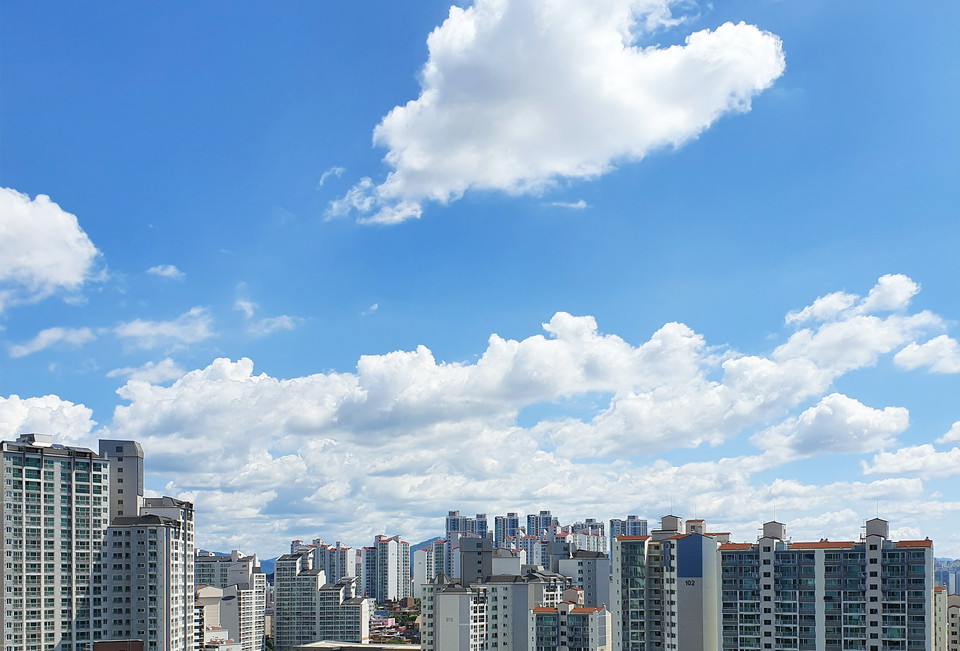
By Sunny Um Wired Korea
Every cloud has a silver lining. Though trite, this axiom nonetheless applies to the spread of the novel coronavirus, or COVID-19, given reports that Korea’s air quality has improved since the outbreak of the epidemic in January. Warnings about dense fine dust in the air are few and far between these days.
With the chill from COVID-19 sweeping the nation with new confirmed cases, people are now told by the public health authorities to stay at home and keep two meters away from others when they have to go out.
They are heeding the advice overall faithfully, given that once bustling shopping districts in Seoul and elsewhere are being deserted. Shops and restaurants in Myeong-dong and Gangnam in Seoul reportedly find their sales have dropped more than 50 percent since January.
As corporate employees are working from home and students are awaiting online schooling, airlines are grounding their planes and mass transit corporations are operating fewer buses and trains. Production facilities are being idled throughout the nation as demand is tanking.
The slowdown in economic activities translates into a cut in greenhouse gas emissions and other pollutants in the air.
There are many other factors that affect the quality of air, as is pointed out by scientists. But the spread of COVID-19 and a subsequent campaign for social distancing has left an indelible footprint in the improvement of air quality. The level of fine dust in air in the Seoul area dropped 27 percent last month from a year ago, according to an April 1 report from the Ministry of Environment.
“Air pollution usually becomes worse when there are more vehicles and people on the move,” says a researcher of Environmental Politics at Yonsei University. “This time of the year, March or April, is usually when the concentration level of fine dust is the highest. But not many people are complaining about the dust level this year thanks to COVID-19 containment measures,” she says.
Also, factories that have shut down in China have contributed to making the sky bluer, with the air pollutants from China accounting for more than 30 percent of fine dust in the air in Korea. Many of the Chinese factories stopped operation at the start of the year and the use of coal has decreased 40 percent at the six largest power plants in China since the last quarter of 2019.
It is not only the fine dust concentration that is being reduced. There are less carbon dioxide emissions as fewer cars run on the streets, fewer planes fly and fewer ocean-going ships sail. This will give greater protection against climate change, as Korea will see a notable reduction in its fossil fuel usage.
The COVID-19’s similar impact on the air quality is found in other countries. In China, the amount of greenhouse gas emissions went down 25 percent in the first two months of the year as people were told to stay behind doors. Europe’s carbon dioxide emissions are projected to decrease by almost 400 million tons from before the outbreak of COVID-19, says Marcus Ferdinand of the Independent Commodity Intelligence Service. According to another projection, the carbon dioxide emission will likely decline 0.3 percent to 1.2 percent worldwide.
History shows that economic paralyses, be they caused by a pandemic or a shortage of foreign exchange reserve, have lowered carbon dioxide emissions in Korea.
For instance, the 1997 currency crisis was accompanied by a huge drop in carbon dioxide emissions in Korea. The international recession in 2008 also lowered the level of Korea’s emissions in the following year.
However, COVID-19 may not have a long-lasting effect once it is over unless people change their lifestyle, says the researcher from Yonsei University. Emissions will rise back to the previous level when people return to their life as usual.
“Carbon is emitted from the most common routines, like driving cars and taking trains,” she says. “There could be a drop in the carbon emission compared with the last year, but the emission level may rise back unless we change our lifestyle fundamentally.”
Changing the lifestyle is easier said than done. That is the reason why it is necessary to redouble efforts in the wake of COVID-19 to enhance public awareness on climate change and its impact on life.
It is no less important to put greater pressure on business enterprises to reduce the consumption of fossil energy, say environmentalists, given that manufacturers and energy-related corporations are responsible for about half of the nation’s air pollutant emissions, as shown by a Korean Society of Environmental Engineers’ study.
“Not many Korean companies show much enthusiasm in the environmental issues,” says Lee Ji-eon, climate and energy coordinator at Korea Federation for Environmental Movements. “Some companies claim they’re planning to change energy sources from fossil to renewable. But what is more important is to sharply reduce the amount of fossil fuel consumed in the industry.”
Park Min-hye, corporate partnership senior officer at World Wide Fund for Nature agrees that Korean companies should be more active in reducing carbon emissions and fine dust in the air.
“Korea is one of the countries that have the highest level of carbon emissions in the world,” she says. “It would not be possible for Korea to reduce the amount if big corporations do not participate.”
와이어드 코리아=Sunny Um Staff Reporter
sunny@wired.kr
저작권자 © WIRED Korea 무단전재 및 재배포 금지
와이어드 코리아=Sunny Um Staff Reporter
sunny@wired.kr
저작권자 © WIRED Korea 무단전재 및 재배포 금지
이 기사를 공유합니다


 뉴스레터 신청
뉴스레터 신청